A parent’s guide to behaviour and relationships at Hill View Primary School.
At Hill View Primary School, we believe that ‘every teacher has a right to teach without interruption and every pupil has a right to learn. Each child has the right to be safe and every parent has the right to information about his or her child’s behaviour. We want to work in partnership with parents and carers to encourage high standards. We have high expectations of our children’s learning and behaviour in order to maintain a good learning environment. We want to work in partnership with parents and carers to encourage high standards. We have high expectations of our children’s learning and behaviour in order to maintain a good learning environment. Our full Behaviour Policy can be found in our policies section. This page has been written for parents and to make access to key parts of the policy more accessible to parents.
At our school we focus on developing positive behaviours for learning and successful relationships. We aim to provide a consistent, positive approach to empower children to take responsibility for their actions and to learn how to behave in a socially acceptable way. We value parental support and ask that you help and encourage your child to keep the Schools ASCENT values and school rules to behave appropriately. In the picture below you will see our 5 ASCENT values and our three school rules: READY – RESPECT – SAFE (RRS).
The full behaviour policy can be found in the policies section on the website and below. This page has been designed to make the contents of the policy more accessible for parents.
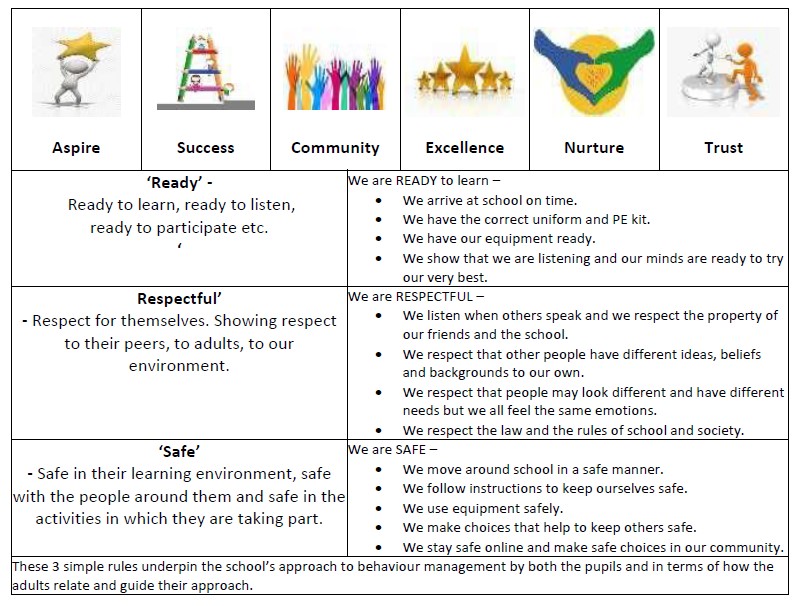
Behaviour and Relationships at Hill View
Here you will find details of our school approach to Behaviour and Relationships.
Appendix 1 – Hill View Primary School Behaviour Expectations and Routines
Rewards and Consequences
Here you will find information relating to the school’s rewards and sanctions for day to behaviour management.
We will be adding to this sections with information about the different badges that can be awarded at the school across various subjects.
Other appendices from the Behaviour Policy
hERE YOU WILL FIND EASY ACCESS TO THE OTHER KEY APPENDICES RELATING TO OUR APPROACH TO BEHAVIOUR AND RELATIONSHIPS.
Appendix 2_Removal from the Classroom
Appendix 4_ Investigations of Incidents and Alternative Action
Appendix 5_ Use of Reasonable Force
Appendix 6_ Searching, Screening and Confiscation
Appendix 7_ Record keeping for Behaviour Auditing, Behaviour Plans, Risk Assessments and Reviews.
How do children know what the expectations are?
At the beginning of every new School year, we take time to explore the ASCENT values and our School Rules and Expectations. The children work through these with their teacher and a signed charter is displayed in every classroom.
Having only three school rules means that they are simple and easy for every child to follow.
The ASCENT values, school rules and class charters are also reviewed at the start of every term and are frequently discussed in class and in assembly.
What should parents do if they are concerned about a behaviour incident?
Whatever the problem we know that it can be very worrying and stressful for parents if they feel their child is “in trouble.” Or if an incidence has occurred that may cause concerns. We will always involve parents if an incident is serious or if the same small problem keeps happening. If however you are concerned about anything, please contact us as soon as possible.
1) Please talk to the class teacher first. They will often have first-hand information of any incident.
2) If needed other members of staff may be involved.
Whatever happens we will always find the facts out first and then deal calmly with the problem.
RELATIONSHIPS
All staff are responsible for adhering to positive practice that promotes a pupil’s ability to engage in, and access their learning. This is based on the understanding that pupil’s best achieve, develop and reach their true potential when staff are fair, flexible, trustworthy, respectful and model positive relationships.
‘The ability to form meaningful relationships is fundamental to mental health and happiness. It’s the quality of contact we have with other people that is arguably the most important determining factor in our quality of life. We can only truly develop ourselves through relationships with others’ (TISUK 2019)
‘Just one emotionally available adult in school, community or home can make all the difference.’ (TISUK 2019)
As a school, we use a PACE approach, emotion coaching and tools such as the 5 point scale to enable all adults to relate to the children in the school, to teach them to regulate or enable them to self-regulate and to then reflect on choices made.
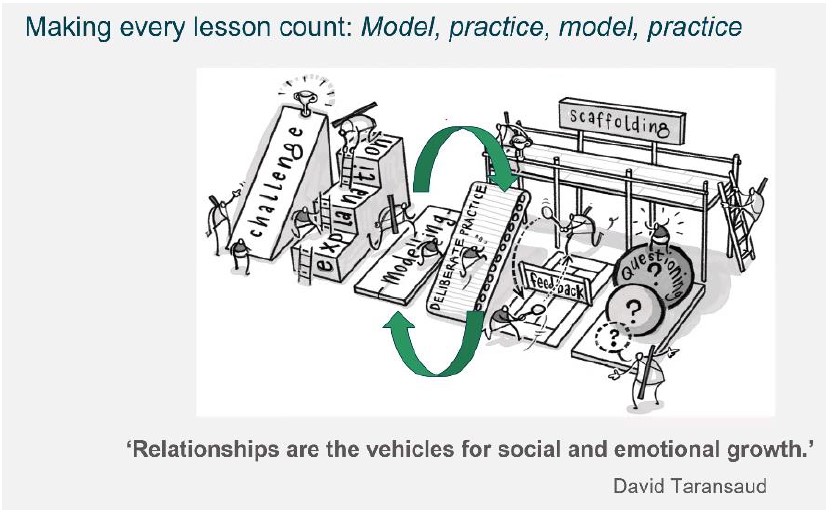
We want children to become self-disciplined and able to self-regulate to manage their choices, not to just behave because an adult is present. We believe that making mistakes is an opportunity to learn and if a child is unable to demonstrate some of our ASCENT values we ask them to think about the choice they have made and consider this statement:
We use rewards to encourage and reinforce good choices. We have a hierarchy of sanctions, which are the negative consequences of children making a poor choice about how to behave.
REWARDS
We strive to notice and reward children who are behaving well. Children thrive on praise and so we frequently make positive comments as this motivates them and raises their self-esteem.
Children who follow our ASCENT values, School Rules and Expectations will be rewarded.
Good behaviour is rewarded in a variety of ways. The children can be rewarded by being given:
- a smile and proximity and acknowledgement and affirmation from an adult
- a “thank you for ………..”
- a sticker
- a note sent home
- a ‘100 square’ reward point
- a certificate
- name on the recognition board or superstar board
- responsibility for the class or School.
‘100 SQUARE’ CLASS REWARD POINTS
Children collect reward points for their class ‘100 square’. The teacher negotiates a reward with the class prior to collecting points e.g. an extra 15 minutes’ playtime, investigation time or watching a 15 minute video. The ‘100 square’ and negotiated reward is displayed in the classroom.
In the differing phases, children also have ways to celebrate their behaviour choices;
In EYFS children begin to learn about the school rules and expectations, when they demonstrate these good choices they can earn balloons and stickers.
Key Stage 1 use ‘Dojos’. The online Dojo reward system; where children are assigned characters, they can earn ‘dojos’ (points) when they demonstrate skills or values that reflect the schools ASCENT values and expectations. The system enables teachers to continue to build on the teaching in EYFS to create a positive culture. It allows children to learn about how to develop a positive growth mind-set.
In lower Key Stage 2 the children have sticker charts, which follow on from the same teaching and expectations as Key Stage 1 and these are celebrated in wizard assemblies.
As the children continue through the school they can apply their understanding of the ASCENT values, school rules and expectations by having opportunities represent the school and be role models to their peers and the younger children of the school.
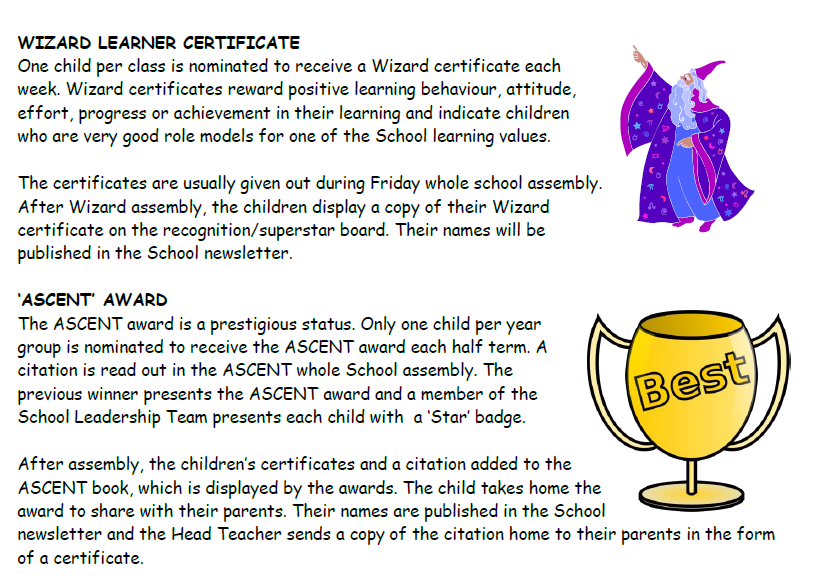
RESPONSIBILTY
Children may also be considered for an additional whole School responsibility:
- Ambassador – Year 6
- Early morning and lunchtime monitors
- School responsibility
- Playground leader
- Sports leader
- Librarian
- Classroom monitor
- Play leaders
ATTENDANCE
Our approach to attendance is rooted in trying to ensure that all children want to come to school because:
- They enjoy and want to be here:
- They want to learn and they have a thirst for learning:
- They feel safe, happy and secure.
If there are barriers to attendance, or indeed to behaviour, then we will always try and work with parents to address these barriers.
We use approaches based in the essentials of what children need to thrive and grow and what makes good parenting.
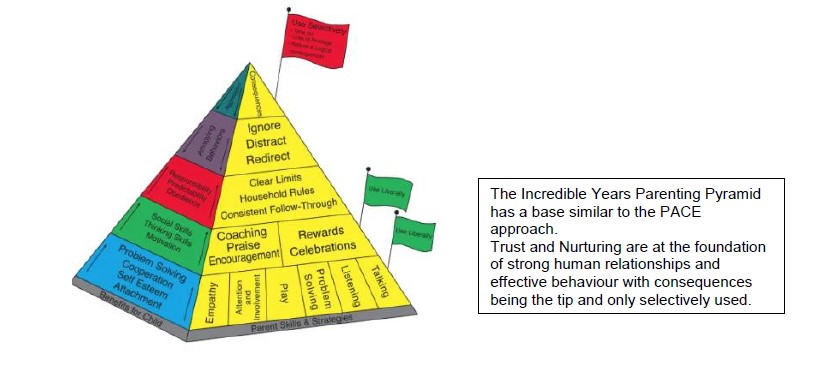
How do we minimise poor behaviour?
Staff take a positive approach initially:
- Give a smile and a reminder to engage. Provide private verbal encouragement quietly to the child.
- Put yourself in the child’s shoes; would you want to engage?
Can the child actually access the task/learning?
How can the learning be adapted for him/her?
Does s/he need any further resources?
Does s/he just need some adult help?
Staff will consider and address whether there is anything else that may be worrying/upsetting the child.
Does s/he need a walk and a talk with someone?
Class staff to talk to TAs/ SLT to see if they are aware of any family issues that have occurred today/recently.
- Give the child a job to allow them some space.
- Ensure someone helps the child catch up with any learning points later, so s/he is not starting at a point behind peers with any further learning.
- Use the emotion coaching script/PACE approach and 5 point scale- which all staff should have available to them.
- Allow children to have time in a regulation station or safe place if needed.
Above all, our staff always ensure that learning is motivating and accessible and seek to explore the underlying cause behind what the behaviour is communicating to those around the child. It may be that they want attention or that they want to say ‘No’ but they don’t have the words for this.
Part of resolving this may require a meeting between school staff and Parent/ Carers to understand and map out what the triggers may be so that these can be support and addressed. Learning may need to be adapted or support provided. An upset child may need a walk and a chat with an adult, reassurance through working near the teacher or beside a friend, or a promise that an adult will find time for them at a specified time.
On those rare occasions where despite focusing on positive behaviour, we recognise that there will be times for some children were they will choose not to follow our School ASCENT values and class charters. Where this happens this is likely to result in a sanction. Sanctions are used in a balanced way and will focus on the act not the child. Children will be helped to understand why their behaviour is not acceptable. Sanctions are there to help children learn to make a different and better choice next time.
TRAFFIC LIGHT SYSTEM
This is what happens when children choose to not demonstrate the schools ASCENT values. We use traffic light colours to encourage children to make a positive choice in their behaviours and to indicate when further action and reflection time is needed. Children who have chosen to not demonstrate the schools ASCENT values and disturb learning for themselves or others will be guided through the system to help them reflect and turn around their chooses. Class teachers/adults will give verbal warnings and have reflective conversations with the children 1;1 if this process is needed to be put in to place to support a child’s choices.
POSITIVE PRAISE SYSTEMS
On occasions, children get into a negative cycle of behaviour. Class teachers or a member of the School Leadership Team may use a sticker chart or positive report with a particular target to break the negative cycle.
REPORT CARD
Children demonstrating persistently challenging behaviour or poor behavioural choices may go on an Individual Behaviour Plan and be put on report for a sort while, usually 2/3 weeks, to monitor their behaviour more closely. Specific targets are set and the child must report daily to a member of the School Leadership Team who will monitor their progress. The report card is sent home for the parents to check and comment.
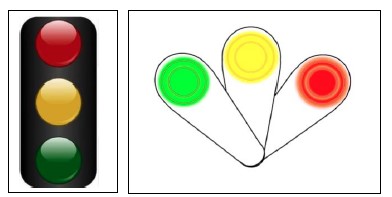
FOLLOW UP ACTION
Staff should then decide the appropriate level of follow-up action and record this, informing parents/carers/SLT as determined by the level of the behaviour (See appendix 1) e.g.
- Discussion with adult (could be during breaks/lunchtime)
- Time out/away from area of conflict NB. if this involves a child being asked to leave the class they are to be supervised at all times and remain the adult’s responsibility.
- Restorative/reparation action – how can issues arising from the wrong behaviour choice be ‘made right’?
It is important that all high level incidents/incidences are thoroughly investigated by SLT and the correct consequences are put into place, taking into consideration all the individual needs of the children involved. This is not always a quick or simple process, so we appreciate parents/carers understanding during this process.
ANTI-BULLYING
We have worked hard to eradicate bullying and behaviour that is seen as bullying, and are proud to say that it is rarely seen at Hill View Primary School. We have been awarded Silver Anti-bullying accreditation by the Anti-bullying alliance. Please read our no-tolerance anti- bullying policy on the School website to learn how we identify and deal with bullying if it does occur. If you have any concerns regarding bullying, please contact the class teacher or a member of the School Leadership Team.
BEHAVIOUR OUTSIDE THE CLASSROOM
Unacceptable behaviour outside the classroom will be dealt with by any member of staff who witnesses it. Unacceptable behaviour may result in a loss of break and/or lunchtime or in internal exclusion. If at break time or at lunchtime, the child will be directed into the School where they will have time to do ‘Good Thinking’, reflect on the consequences of their action, and receive guidance on how to make a positive choice in the future.
BEHAVIOUR OUTSIDE OF SCHOOL
If it is brought to the attention of the School that a child is behaving inappropriately on their way home or to School, the individual will be spoken to and an appropriate sanction taken. The child’s parents will be informed of the incident and action taken.

SPECIAL EDUCATIONAL NEEDS
The School acknowledges that a small minority of children may need support to help them manage their behaviour. This may be especially true of children with special educational needs. Children who need extra support with their behaviour will have individual plans and work towards receiving the same kind of rewards as other children. They may need additional support provided by the learning/behaviour mentor.
INDIVIDUAL BEHAVIOUR MANAGEMENT PLANS (IBMP)
For pupils with social, emotional and mental health needs which may impact on their behaviour, an Individual Behaviour Management plan (IBMP) will be written to identify the pupil’s needs and support provided to ensure good outcomes, this will be supported- where needed, with a de-escalation plan. A referral may be made in consultation with parents/ carers to for external support.

